Temporary Visas
There are various categories of nonimmigrant visas for a person who wishes to work temporarily in the United States. Every person who wish to work in the U.S. temporarily needs a specific visa based on the type of work, professional credentials of the employee, and needs of the employer. With the exception of “Q-1 Cultural Exchange Visitors”, the spouse and unmarried, minor children of an applicant under may also apply for the same type of visa in order to accompany or join the principal applicant. Spouses of L1-A and E-2 applicants may obtain an employment authorization document, while spouses of H1-B and O-1 visa holders are not allowed to work.
Some of work visas are subject to annual numerical limitations and other restrictions. For this reason, it is extremely important to plan ahead to secure the opportunity to apply for a visa. Process of obtaining a work visa is lengthy and involves two steps: filing a non-immigrant worker petition with USCIS and, upon approval, visa application.
Treaty Traders and Treaty Investors
Visas E-1 and E-2 are designed for foreign businessmen who wish to develop commerce between the country of their citizenship and U.S. or invest in the business in the U.S. Even though the terms of the visa may vary based on the citizenship of the investor, foreign people entering the U.S. on E visa are usually admitted for two years, after which the stay may be extended.
This type of visa is only available if the country of the immigrant’s citizenship entered into international agreement (“treaty”).
At this point fifty countries that have treaties of commerce with the United States, which makes their citizens eligible for treaty visas. Applicant for E-1 Treaty Trader visa needs to prove that between his country and the United States there is currently trade, i.e. commercial exchange of goods or services in the international market.
Qualifying countries for E-1 visas:
Argentina, Australia, Austria, Belgium, Bolivia, Bosnia-Herzegovina (Yugoslavia), Brunei, Canada, China (Taiwan), Colombia, Costa Rica, Croatia (Yugoslavia), Denmark, Estonia, Ethiopia, Finland, France, Georgia, Germany, Greece, Honduras, Ireland, Israel, Italy, Jamaica, Japan, Korea, Latvia, Liberia, Luxembourg, Macedonia (Yugoslavia), Mexico, Netherlands, Norway, Oman, Pakistan, Paraguay, Philippines, Slovenia (Yugoslavia), Spain, Sri Lanka, Suriname, Sweden, Switzerland, Thailand, Togo, Turkey, U.K. and Yugoslavia.
The E-2 Treaty Investor must show that he either made a substantial investment or is in process of arranging for a substantial investment in a treaty enterprise. There is no definition of the amount that is considered substantial investment, but the requirement is that these funds or assets are be irrevocably committed to the investment.
Qualifying countries for E-2 visas:
Argentina, Armenia, Australia, Austria, Bangladesh, Belgium, Bosnia-Herzegovina (Yugoslavia), Bulgaria, Cameroon, Canada, China (Taiwan), Colombia, Croatia (Yugoslavia), Republic of Congo, Democratic Republic of Congo (former Zaire), Costa Rica, Czech Republic, Ecuador, Egypt, Estonia, Ethiopia, Finland, France, Georgia, Germany, Grenada, Honduras, Ireland, Italy, Jamaica, Japan, Kazakhstan, Korea, Kyrgyzstan, Liberia, Luxembourg, Macedonia (Yugoslavia), Mexico, Moldova, Mongolia, Morocco, Netherlands, Norway, Oman, Pakistan, Panama, Paraguay, Philippines, Poland, Romania, Senegal, Slovak Republic, Slovenia (Yugoslavia), Spain, Sri Lanka, Suriname, Sweden, Switzerland, Thailand, Togo, Trinidad and Tobago, Tunisia, Turkey, Ukraine, UK, and Yugoslavia.
e-2 visa?
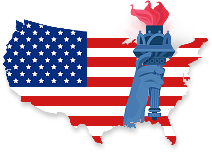
The E-2 Visa is an INVESTOR VISA
This type of visa allows foreign nationals from a nation with an E-2 trade country to come to the U.S. to start a business and bring key employees.
How to obtain E-2 VISA?
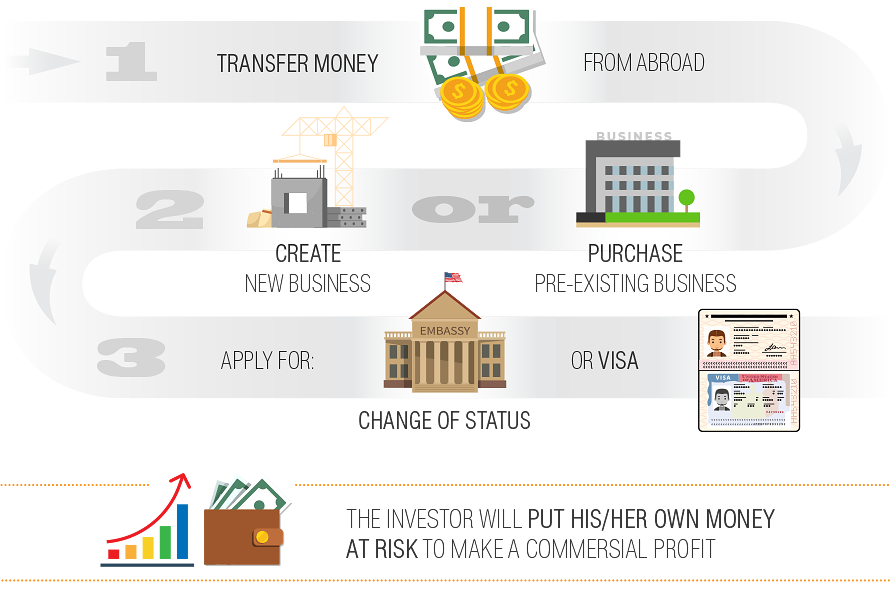
Who qualifies for an E-2 VISA?
The investor must play a key role in the business enterprise and be either:

WHAT ARE REQUIREMENTS for the business?
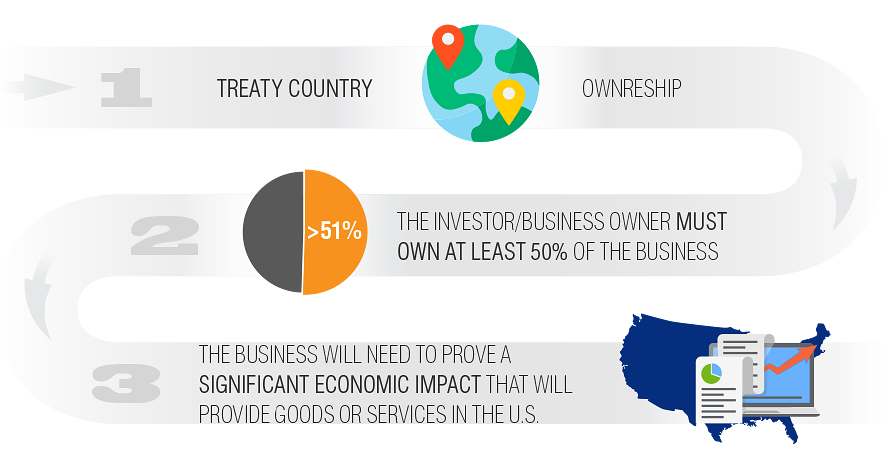
L-1 Visas: Intracompany Transferees
The L-1 visa is a nonimmigrant visa that is issued for executives, managers and employees with specialized knowledge transferring from the company overseas to the parent, affiliate, branch or subsidiary office of the same company in the United States.
The L-visa is issued for three years and can be subsequently extended; the period of extension for L1-A is four years, and for L1-B – two years. L-visa is a so-called dual intent visa, i.e. the applicant can subsequently apply for a green card.
It is also possible to obtain a visa when opening a new branch of an overseas corporation in US. In that case the applicant needs to hold a managerial position in the overseas corporation and arrive in a managerial capacity here as well. The L-1 visa for a new corporation can be opened for a year and subsequently converted into a long-term L.
Executives and managers apply for L1-A
In order to apply for L-1A (executives and managers) the applicant needs to show that he supervised professional staff or performed some major function in the company. Supervision of lower level employees is not sufficient; the applicant must have influenced the company’s policies as opposed to directly performing the work. No labor certification is required for L-1A.
Professionals with specific knowledge apply for L1-B
In order to apply for L-1B (professionals with specific knowledge) the applicant needs to demonstrate that he has information about company’s policies, research, and procedures that have to do exclusively with the petitioner’s business organization as opposed to the general knowledge of the standards in the area. Professionals with specific knowledge need to go through the PERMProgram Electronic Review Management (PERM) is the system used for obtaining Labor Certification process.
Regardless of the category in which he applies, the applicant has to show he worked for the sponsoring company for at least one year out of the three last years. He does not have to be an employee; as long as the sponsor company managed and controlled his work during that year he could be paid through a separate agency and be employed as an independent contractor.
An applicant can file for L-1 as a change of status if he is in the United States or though the embassy if he is outside.
Benefits of applying for an L-visa as compared to H1B is that there is no cap on the number of visas issued.
L-2: Spouses and Kids
Spouses and unmarried children of L-1 visa applicants qualify for an L-2 visa, which allows them to work in the United States, or attend school or college.
l1-a visa

The L1-A (non-immigrant) Visa provides an avenue for multi-namtional companies to transfer executives and managers to the U.S. for certain periods of time. Foreign business owners/managers are given the opportunity to expand an already existing foreign company in the U.S. or establishnew operations in the U.S.
QUALIFICATIONS

L1-A is designed for managers and executives of foreign companies operating in the U.S.
Valid up to 7 years

L1-A may be obtained to work for
existing business or new office

Requires business operation in the
U.S. and abroad

Employee must have 1 year
experience out of 3 preceding
applications
BENEFITS

There is no annual limit on how many L1-A applications can be approved

Workers can bring their spouses and dependents. Spouses are able to obtain documents to work in the U.S. and children are able to study in the U.S.
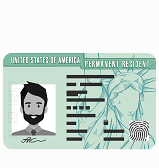
The L1-A visa can potentially lead to a green card by filing an EB-1C petition
H1-B Visas: Temporary Specialty Workers
The H1-B visa is a nonimmigrant visa that is issued for three years and can be subsequently extended for another three years; it allows a foreign professional to work in the United States in a professional position.
An H1-B holder who worked in the United States for six years can be eligible for another six years term if he leaves the United States for a full year between the two applications or if the work that he was performing in the United States was seasonal, intermittent or continued for less than six months per year. Extension over the period of six years can be granted if the applicant’s labor certification application or immigrant visa petition has been pending for one year; or the I-140 is approved and a visa number is unavailable.
The H1-B visa holder can switch employers without leaving the country but the new employer would have to file a new H1-B for the employee. The applicant though can start working for the new employer once the petition is filed.
The applicant for an H1-B visa needs to have a Bachelor’s degree in a field related to the profession; degree requirement can be substituted by related working experience, where every three years of experience cover one year of education. The employer must prove that he shall pay to the applicant at least the prevailing wage.
H1-B Cap
At this point there is a limitation on the amount of H1-B visas that can be issued per fiscal year: 65,000 visas are available and additional 20,000 are reserved for holders of a Master or higher degree from a United States institution.
H1-B Application Procedure
In order to file of an H1-B the applicant needs to go through a two-step process:
- Submit an LCA application to the U.S. Department of Labor, in order to show that the employer meets the wage requirements and working conditions;
- File the actual petition and documents with the Service Center proving that the employer and the individual meet the criteria for the H1-B visa.
An applicant can file for H1-B as a change of status if he is in the United States or though the embassy or consulate if he is outside.
Full-time student holding an F-1 visa can file a change of status well in advance, because he cannot start working pursuant to the H1-B visa until the petition is approved and a visa number is available. The student does not have to leave the United States after his petition is approved and the visa number is out; also, under the so-called cap-gap rule, the student’s F-1, optional practical training and the work authorization connected with the latter shall be extended if the October cap applies and the student has maintained his status. If the student changes status to H1-B in the United States and leaves the United States, he would need to obtain a new visa in his passport before reentering the U.S., except for those who fall under the automatic revalidation rule.
If a student has violated his status at any point and a formal finding to that effect was issued, he must obtain a new H1-B visa abroad through consulate process.
Employers Responsibilities
The employer, unless exempt from paying the fees, must pay the petition filing fees and may not request reimbursement from the H1-B employee. The employee is only allowed to pay the attorney’s fees, and only where his wage exceeds the prevailing wage by the amount of the fees: otherwise, the employer or a third party have to take care of the fees.
Spouses and Kids
Spouses and unmarried children of H1-B visa applicants qualify for an H-4 visa, which does not allow them to work in the United States, but they can attend school or college.
h1-b visa

REQUIREMENT FOR H1-B speciality occupation.

Foreign Worker
with Bachelor Degree
OR 12 years of experience


Employer
with business necessity
+ ability to pay
APPLICATION PROCESS
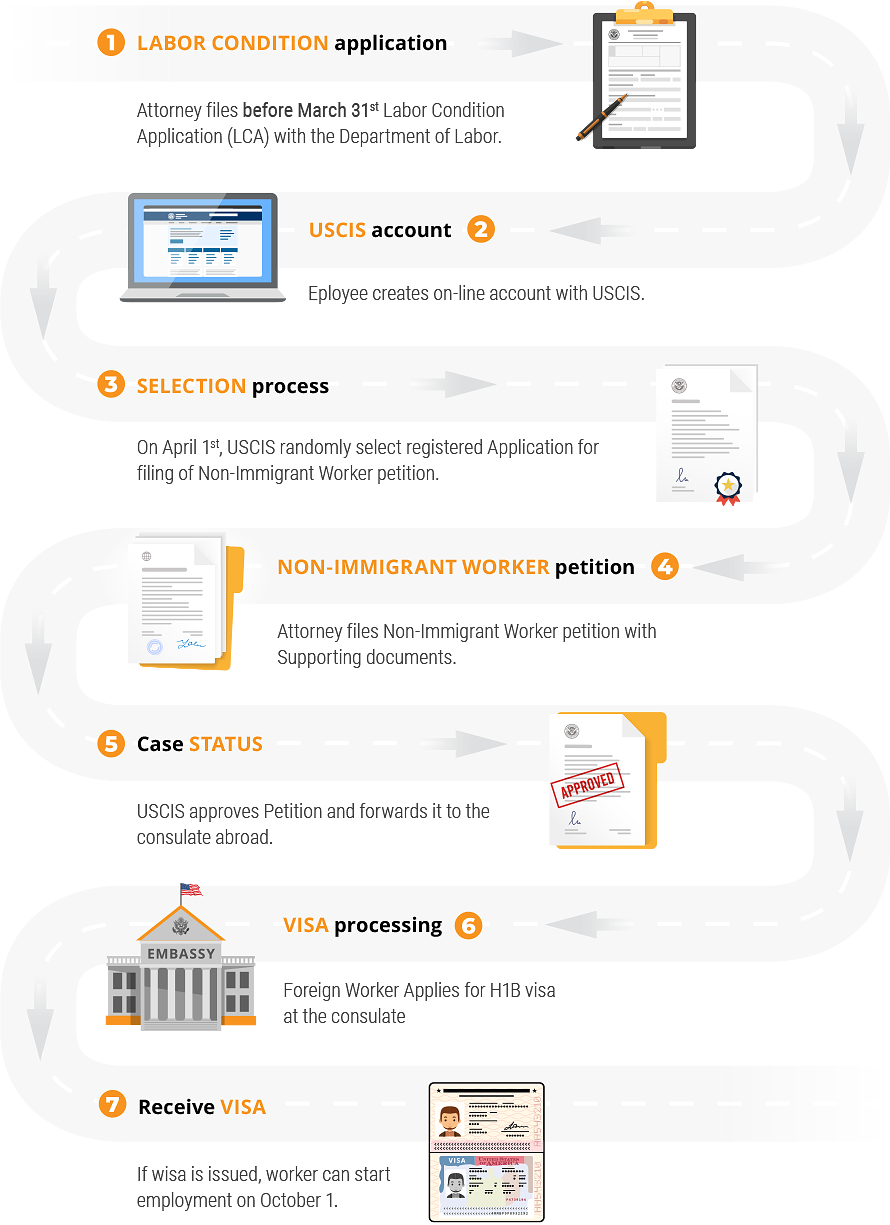
O-1 Visas: Aliens with Extraordinary Ability
O-1 visa applicant needs to prove that due to his extraordinary ability in the sciences, arts, education, business or athletics, or extraordinary achievements within motion picture and/or television he achieved sustained or international acclaim; i.e. that the applicant is one of a small percentage at the top of his field. Extraordinary ability can be proven through contracts, awards, nominations, published material about the applicant and other documentation reflecting the nature of his achievement. O-visa is renewable in annual extensions and can be granted for up to three years or until the project is finished.
The work performed by the O-1 visa holder has to be temporary; otherwise it makes sense to apply for an EB type of visa. The petition cannot be filed more than six months before the applicant’s services are needed in the US.
The applicant can prove outstanding achievements by showing that he either was awarded an internationally recognized award in the area, or by proving with documents and evidence at least three of the following:
- The applicant received some nationally or internationally recognized prizes or awards for excellence;
- The applicant is a member in an associations in the field which demand outstanding achievement of their members;
- Some international or major national media made publications about him and his achievements;
- The applicant was a judge of the work of others in the same or similar field of endeavor;
- Something else that would prove his contributions of major significance to the field;
- The applicant wrote scholarly articles in professional journals or other major media; displayed his work at artistic exhibitions or showcases, or something of that nature;
- The applicant is highly respected by other professionals and scholars in the field;
- The applicant was employed by organizations or establishments that have a high reputation in the field.
If the above standards do not readily apply to your occupation, you may submit comparable evidence in order to establish your eligibility.
You will also need to provide a contract between you and your employer that describes the terms and conditions of services to be performed, or a summary of the terms of an oral agreement. For specific events, you should provide a specific itinerary showing the schedule and ending date of events.
O-1 visa

WHAT AREAS ARE AVAILABLE
for “outstanding ability” worker?

Science

Education

Sport

Art

Business
WHO CAN FILE PETITION
for O-1 worker?

U.S. Employer
(Business entity, including the one formed by O-1 worker)



U.S. Agent
(Third party, arranging contracts with multiple employers)

WHAT DOCUMENTS
are required?
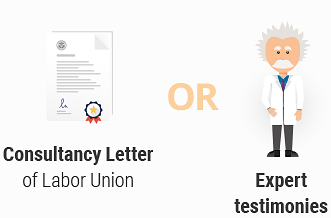


Evidence of outstanding abilities
– publications – presentations
– evidance of high salary
– awards, etc
Let's talk about your case
For free assessment of your case send us an e-mail or use the contact form on this site. If your case requires in-detail discussion, we will be happy to schedule a consultation to talk about your options.
No matter what immigration need you have, you can always rely on prompt and professional response from us.
Contact Us